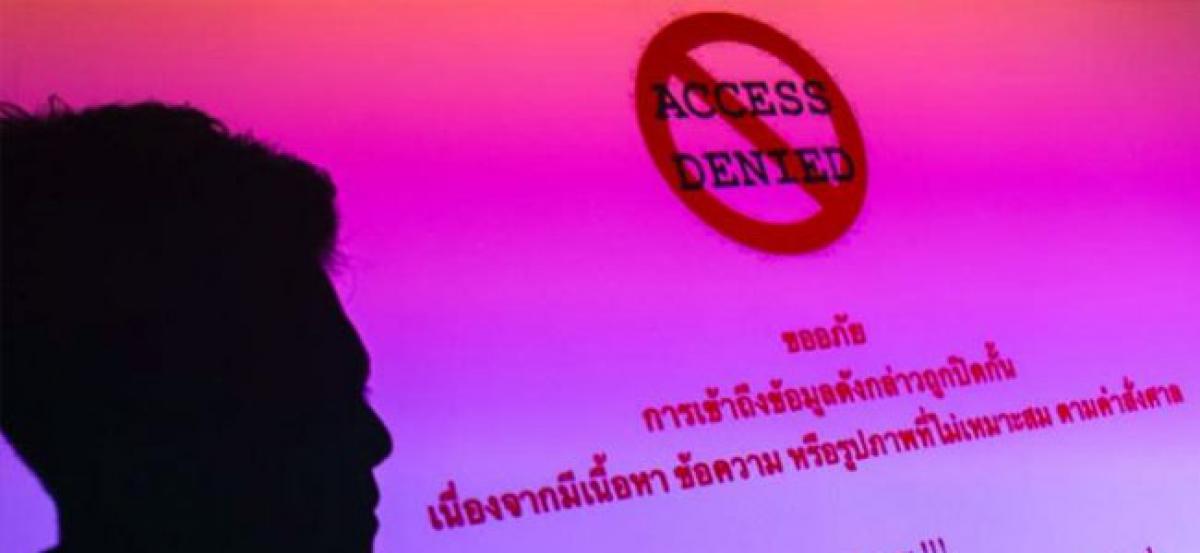Live
- Bengal: Senior resident doctor accused of rape, attempt to murder absconding
- Prateeksha Srivastava says she seldom meets fellow music composers Rusha, Blizza, in person
- KTR Accuses Government of Brutality Against Farmers, Calls for Immediate Action
- Manchu Manoj Attends Shooting Amid Family Controversy
- BWF World Tour Finals: Treesa-Gayatri defeat Malaysian pair to keep semis hopes alive
- MUDA case: Complainant Krishna asks Lokayukta to file new plaint on CM Siddaramaiah on ED’s report
- Airport capex in India to cross Rs 60,000 cr in fiscals 2025-2027 to handle growing traffic: Crisil
- Five-Year-Old Boy Dies After 55-Hour Rescue from Borewell in Rajasthan's Dausa
- Chaos in Parliament over Congress-George Soros link claims, BJP MP poses questions
- Bus Driver Arrested After Deadly Accident in Mumbai’s Kurla; 42 Injured
Just In

Thailand aims to buy software to strengthen the military government\'s ability to track online networks and monitor online activity while planning a cyber law that will expand powers to pry into private communications.
BANGKOK: Thailand aims to buy software to strengthen the military government's ability to track online networks and monitor online activity while planning a cyber law that will expand powers to pry into private communications.
The beefing up of powers over the online world come as authorities are increasingly targeting social media for violations of a law that makes it a crime to defame, insult or threaten the king, queen, heir to the throne or regent.
The Digital Economy Ministry aims to spend 128.56 million baht ($3.8 million) on software including a "social network data analysis system" to monitor and map individuals and relationships between more than one million online users, according to a ministry document seen by Reuters.
"The software will sweep and store all data available on social media to be analyzed and monitored," Teerawut Thongpak, director of the ministry's Digital Service Infrastructure Department, told Reuters.
He said the government would post a tender for the software and then consider offers.
Governments around the world buy social media monitoring products to chart relationships and networks, as well as to monitor dissidents and identify their leaders.
New York University researchers have also found various U.S. jurisdictions had spent more than $5.82 million on social media monitoring software.
Since a May 2014 coup in Thailand, the military government has arrested numerous people on suspicion of posting material on Facebook and other platforms deemed to violate the royal-insult law.
The legal watchdog group iLaw says 59 people have been found guilty over online posts since the coup. This month, in the toughest sentence yet, a man was jailed for 35 years under the law for posts online.
The government has asked Facebook to block some 300 posts from users in Thailand this year, a sharp increase from 80 restrictions during the period from mid-2014 to the end of 2016, according to Facebook reports.
The junta is also pushing for a cyber security bill, which is expected to be put before parliament this year, despite the concern of civil society and business groups that it will give the government powers for mass surveillance.
NATIONAL SECURITY
The bill is a more intrusive measure than a recently amended Computer Crime Act, say experts, which allows authorities to censor online content but not to pry into private data.
"The bill is aimed at increasing national security, allowing the state to access data of anyone it suspects," said Bhume Bhumiratana, a cyber security expert at Thai company G-Able, which provides services to businesses.
A draft of the bill, seen by Reuters, proposes a National Cyber Security Committee, with junta leader Prayuth Chan-ocha at the helm, with the broad power to command both public agencies and private businesses to help with cyber security investigations.
Other provisions give authorities power to order anyone to report for questioning or hand over information, as well as to tap all communication devices including phones and computers in "emergency cases", without court approval.
The digital ministry said Thailand had to protect itself against crime and denied the procurement of the software and the legislation were aimed at surveillance.
"This isn't about violating privacy but protecting the network," Somsak Khaosuwan, the ministry's deputy permanent secretary, told Reuters.
However, Rittee Intarawut, chief of the army's cyber center, which monitors the web for content critical of the monarchy, said the bill would help the government prosecute royal-insult offences, but law-abiding citizens need not be alarmed.
"There's nothing to fear if you have done nothing wrong," he said.

© 2024 Hyderabad Media House Limited/The Hans India. All rights reserved. Powered by hocalwire.com







